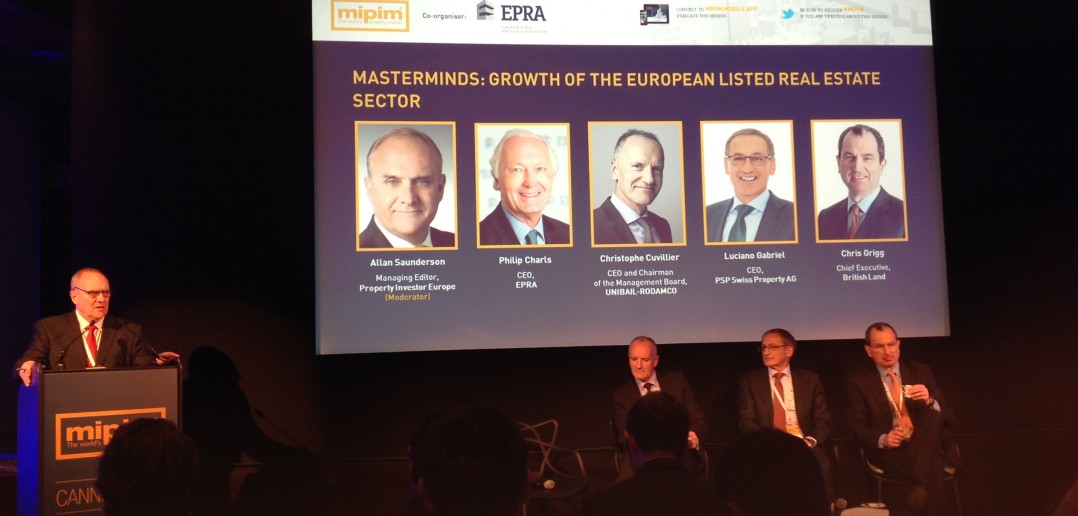MIPIM 2015 Masterminds Session: Growth of the European listed real estate sector
Co-organiser: EPRA
Moderator: Allan Saunderson, Managing Editor, Property Investor Europe.
- Philip Charls, CEO, EPRA
- Christophe Cuvillier, Chairman of the Management Board and Chief Executive Officer, Unibail-Rodamco
- Luciano Gabriel,CEO, PSP Swiss Property AG
- Chris Grigg,Chief Executive, British Land
Here are some key quotations, thoughts and opinions from the the unique Masterminds session co-organised by EPRA with 4 major CEOs on scene debating about the growth of the European listed real estate sector.
Why invest in listed real estate?
Opening by Philip Charls, CEO, EPRA CEO
- Challenges and opportunities for UK and Continental European commercial property markets, from the CEO’s of the leading listed real estate and REIT’s.
- Winning strategies to attract global investors and boost European cities and economies.
Christophe Cuvillier, Chairman of the Management Board and Chief Executive Officer, Unibail-Rodamco
- European real estate: the quality of assets rests the same, however it is difficult to invest in existing assets, as competition is fierce, prices are high, but it might change in the future.
- Outbound investments: there is no urgent need to invest abroad, « there is so much to do in Europe ».
- Strategy: Unibail-Rodamco‘s property is of great value, mostly in retail (par ex., shopping centres). The best strategy is to invest in retail, as for offices, they prefer to build and sell rather than taking rents. They have no intention to « go outside Paris ». They prefer to « know the market before they go ».
- Great example – La Défence (Paris): there are a few great projects launched there by the company.
- Political situation in France: 90 % of investors are not French, French people prefer investing abroad
Luciano Gabriel,CEO, PSP Swiss Property AG
- Swiss market: it is better to focus on the middle and long terms investments, as there were no dramatic changes in the market during the last years. Switzerland is a small country with a stable and mature real estate market.
- Outbound investments: no need, because in Switzerland there are many great well-located assets. It’s better to optimise already existing portfolio by innovating and replacing obsolete buildings.
- Offices, retail & mixed use: demand has weakened. Many Swiss companies are located outside the country.
- Example of great project: Mall in Scandinavia
- Inbound investments: there is no political restrictions for foreign investors in the country. There are some touristic resorts & shopping centres acquired by foreign investors. Foreign investors are entering this market, however they are not able to get access to the top property, because it is not available in the market.
Chris Grigg,Chief Executive, British Land
- The UK real estate market: slow recovery. It benefits from international capital flows, an extraordinary amount of global capital comes to the UK (mostly to London). Foreign investors are more likely to invest in London (in already existing assets) than in the rest of UK, however the situation is changing.
- Inbound investments: no real political restrictions for foreign investments, assets are available to everyone.
- Strategy: it is better to concentrate on groups of assets (for example, campus) rather than on individual assets. Mixed-use offices are of great value for investors.
Check out the MIPIM 2015 Conferences & Events Programme
Discover the MIPIM 2015 Live Videos.



